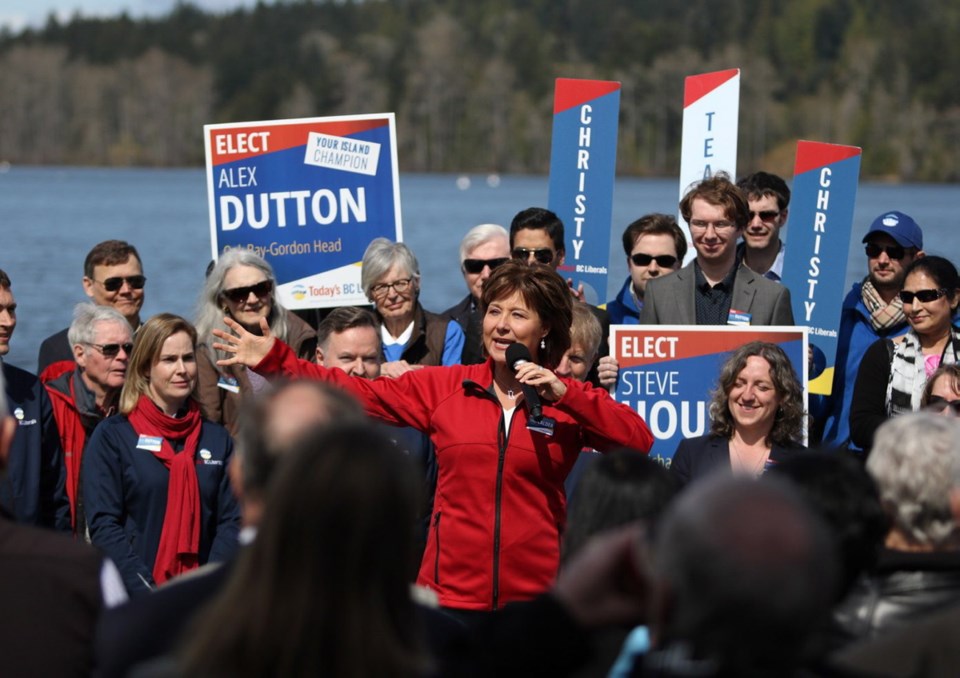 There’s no question the B.C. Liberals’ “Island Champions” slate didn’t live up to its billing.
There’s no question the B.C. Liberals’ “Island Champions” slate didn’t live up to its billing.
But it didn’t collapse completely, either. It just faded slightly in all the wrong ridings, enough so that the breakthroughs the party was so determined to make didn’t happen.
The Liberals pulled in about 105,000 Island votes last week, based on the preliminary count, with thousands more absentee votes still to be counted. That’s down about 16,000 from the 2013 tally. By the time the full count is announced next week, Liberals could be close to their 2013 total, although likely below.
The trouble for the party is, the 2013 results were the typical abysmal showing the Liberals have been producing for more than a decade. Matching the same failed effort as last time isn’t what they had in mind when they dubbed their 14 candidates the “Island Champions” and turned them loose with a tailor-made Island platform.
The party averaged a 29 per cent share of the vote across 14 ridings, down about four points from the 2013 average.
All the attention is on the nine-vote margin that NDP candidate Ronna-Rae Leonard holds over Liberal Jim Benninger in Courtenay-Comox, subject to the additional ballots and a mandatory recount. It’s impossible to predict the outcome, but even if the Liberals catch a break, they will just barely match the two Island seats they won last time.
Behind that story, though, the preliminary numbers show the Liberal vote in that riding dropped seven points from the 2013 count. Part of it might be the fact that Benninger was not as well-known as his two-term predecessor, Don McRae. But part of it may be the general disenchantment with the Liberals and Premier Christy Clark that contributed to the provincewide slump.
There’s also the intriguing performance of Conservative candidate Leah McCulloch. Her leaderless party is a smoking ruin, but Liberals were still worried during the campaign about her spoiler potential because she was relatively well-known. The worries were justified. She grabbed at least 2,000 votes. Subtract her from the Courtenay-Comox ballot and it’s safe to assume Benninger would have done better.
The other crucial drop was in Saanich North and the Islands. Liberal Stephen Roberts was in the thick of things in 2013, just 163 votes behind the winner with almost 33 per cent of the vote.
His share of the vote dropped about six points this time, and he finished third.
The Liberals were also heavily invested in their Cowichan candidate, Steve Housser. He was in the novel position of being a high-profile critic of the Liberal government, on the Shawnigan soil dump, who then ran for the Liberals for the second time, after coming second in 2013.
It didn’t work out well. His share of the vote dropped to 28 per cent from 35 per cent, consigning him to third place.
The more notable aspect of both the south Island races where the Liberals were hoping for a breakthrough is that the Greens won both of them. They not only won three Island seats, they increased their vote share by more than a third (the comparison is slightly skewed by the fact they didn’t field candidates in three Island ridings last time).
The vaunted Liberal Island platform was based on the premise that “for too long, the B.C. NDP have represented the majority of ridings on Vancouver Island.”
It turns out that the Greens did more to start breaking that grip than the Liberals did, by taking two seats from the NDP. They also marked two strong second-place finishes in both Victoria ridings.
Vancouver Island is still an NDP fortress. It tentatively holds 10 seats, the Greens have three and the Liberals have one. But it’s the first election since 2001 where the NDP wound up with fewer seats than it held when it started.
And the novelty of having the first Green caucus in North America, all of them elected on the Island, is a base from which to build even more momentum than the Greens already have.



